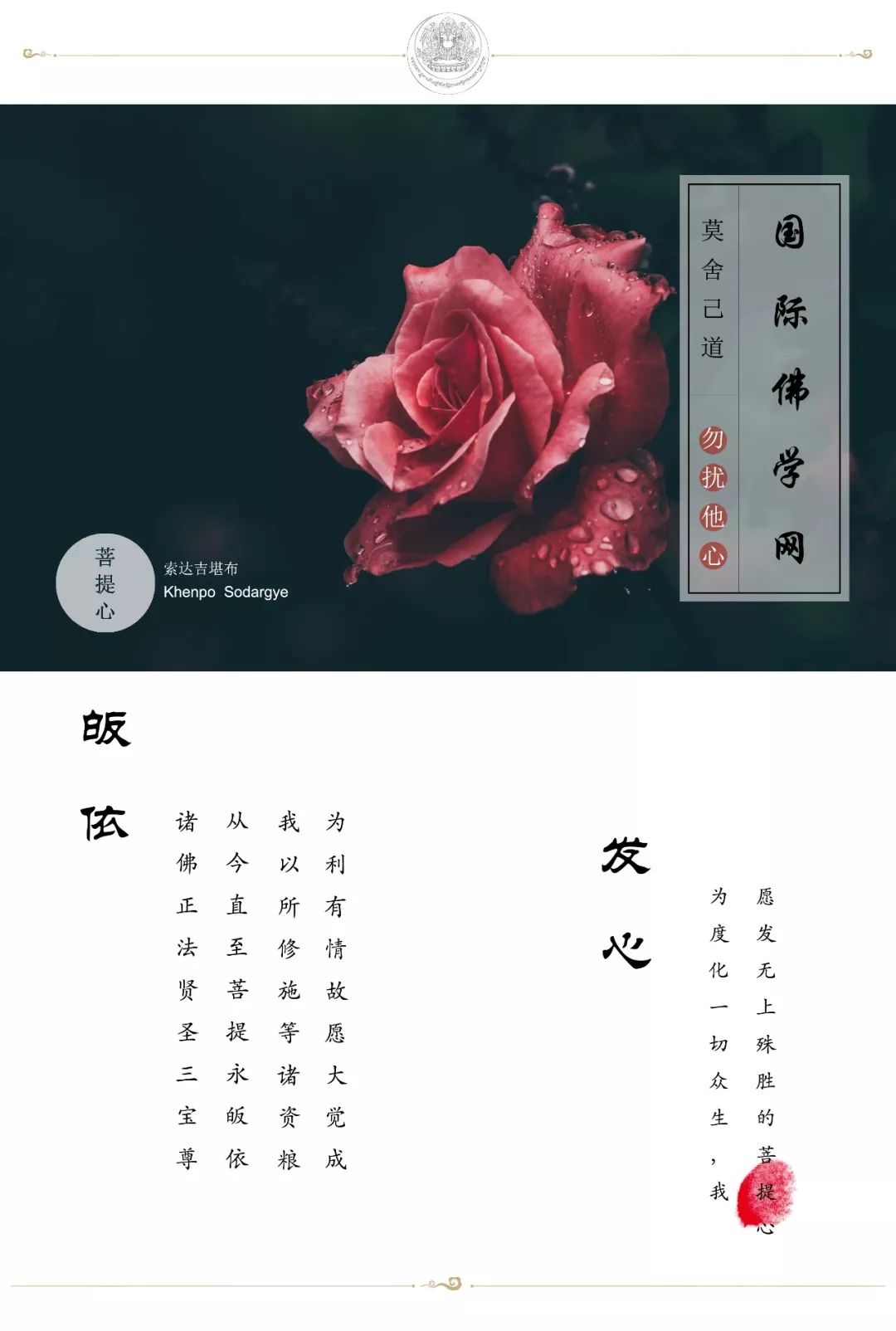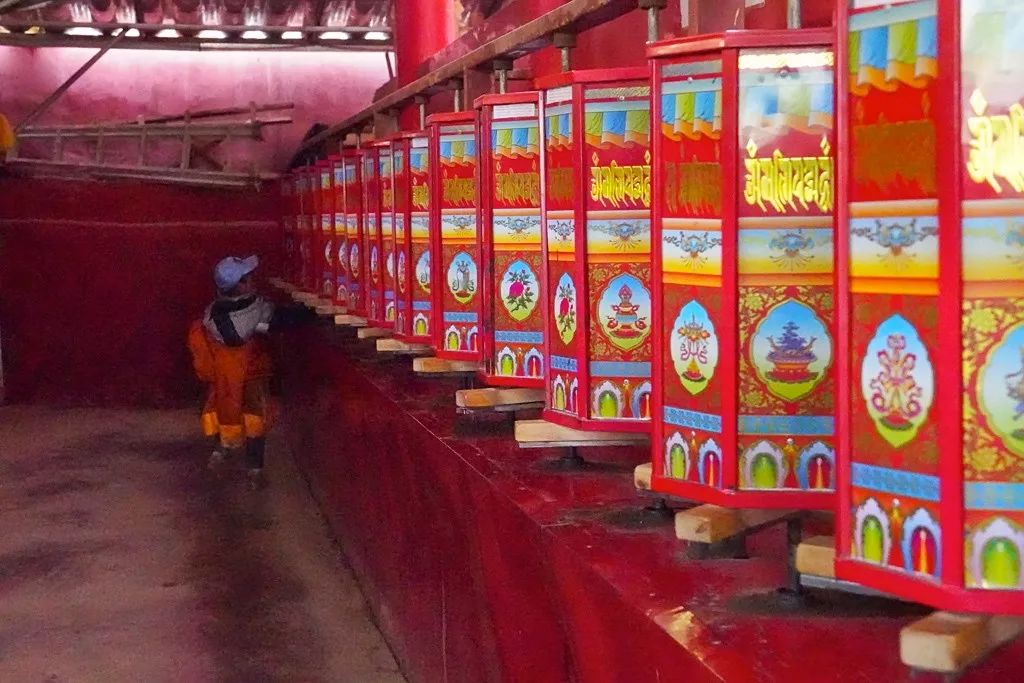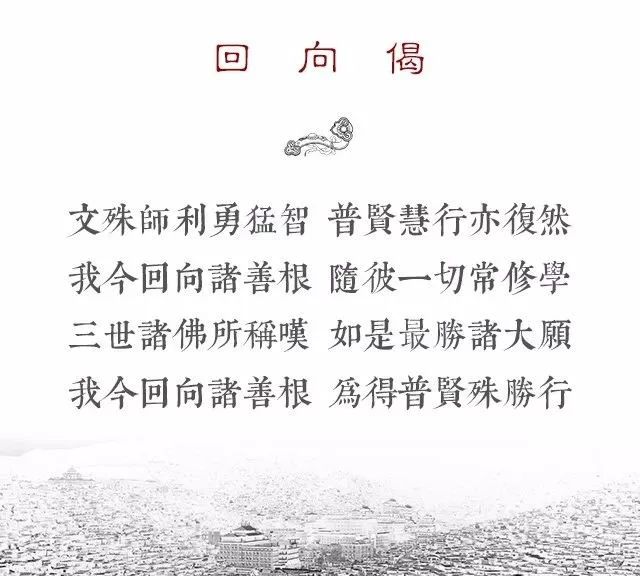
积福是不是一种执著
Accumulating merit is not a form of grasping

若想事业顺利、家庭和合、身体健康,必须要积累福德;
If we wish for a successful business, a happy family, and a healthy body, we must accumulate merit.
若想修行无违缘,不误入歧途,必须要积累福德;
If we wish our spiritual practice to be free from obstacles and errors, we must accumulate merit.
若想开启智慧,乃至开悟、成佛,必须要积累福德。
If we wish to develop wisdom, attain realization and reach Buddhahood, we must accumulate merit.

许多人对佛教的认识,经常有一种误区,
Many people have a misconception in their understanding of Buddhism,
认为“学佛就要不执著善,也不执著恶,一切皆空”,
thinking, “Buddhism teaches that all phenomena are empty, therefore, we should not cling to virtue nor to non-virtue.”
进而做什么都肆无忌惮。
Then they act unscrupulously in all deeds.
其实,空执也是一种执著,而且是最可怕的执著。
However, clinging to emptiness itself is also a form of clinging, and the worst kind at that.
佛陀曾说过:宁可执著“有”大如山王,也不能执著“无”小如芥子许。
The Buddha taught, “Grasping to existence the size of Mount Meru is not as harmful as a grasping to nonexistence the size of a sesame seed.”
在没有明心见性之前,我们必须要执著善的、对的,
Before we realize the mind’s true nature, we must hold tenaciously to what is virtuous.
这就相当于渡河的舟船,在未到彼岸之前,不可能将它抛弃。
It’s like when crossing a river, we must rely on a raft until we reach the other shore.
否则,刚到河中就把船给扔了,结果会怎么样?
What would happen if we abandon the raft in the middle of the river?
相信你我都清楚。
We all know better than to do that, don’t we?
所以,学佛务必要从取舍因果做起,切莫用“不执著”为自己造恶找借口。
Hence, learning the Buddhadharma starts from knowing what to adopt and what to reject, never employ “clinging to nothing” as a convenient excuse to commit evil deeds.
同时,也千万不要把积累资粮放下,毕竟做一点点善事的功德也不可思议。
In the meantime, never neglect to accumulate merit, as even the tiniest good deed will yield incredible benefit.

《旧杂譬喻经》中记载:
There is an account inThe Miscellaneous Metaphors Sutra:
有一次,佛陀到舍卫城乞食,来到一个女居士的家门口。这位女居士戒行圆满,她将饮食供养到佛的钵中以后,退到一面,恭敬而住。
Once during his alms round in Sravasti, the Buddha arrived at the house of a female practitioner who observed the lay precepts perfectly. The lady filled the Buddha’s begging bowl with food and then stepped aside, standing there with deep reverence.
这时佛陀为她说法:“种一生十,种十生百,种百生千,如是生万生亿,得见谛道。”意思是,种下一,可以生长至十;种下十,可以生长至百;种下百,可以生长至千,乃至生长至万、至亿……最终便能见到真谛。
The Buddha then gave her a teaching, “Planting one good seed will yield ten good results: ten becomes a hundred, a hundred becomes a thousand, and further to ten thousand, then a hundred million; eventually one will realize the ultimate Truth.”
女人的丈夫不信佛法,听了佛陀的偈颂,就说:“沙门,你太言过其实了吧,施一钵饭,能得那么多的福吗?”
Hearing this, the lady’s husband, who did not believe in Buddhism, asked, “Sramana, aren’t you exaggerating? How could just offering a bowl of rice result in such enormous good fortune?”
佛问:“你从哪里来?”
The Buddha asked him, “Where are you from?”
他说:“我从城中来。”
The husband replied, “I am from the nearby town.”
佛问:“你见到城中的尼拘类树有多高?”
The Buddha asked, “Have you noticed how tall the nyagrodha* tree in town grows?”
他说:“高达四十里,每年能收获数万斛的果实,它的种子就如芥子一样,很小很小。”
He answered, “The nyagrodha tree reaches up to forty li (an ancient measurement) high, and the fruit it bears can overflow tens of thousands of baskets. Its seed, however, is as tiny as a mustard seed.”
佛说:“那要播多少种子,才能长这么大的树?一升吗?”
The Buddha asked, “How many seeds have to be planted in order to grow this huge tree? Does it take a whole bucket of seeds?”
他说:“不用不用,只一粒种子而已。”
He answered, “Oh no, definitely not. All it takes is just one small seed.”
佛说:“你也太言过其实了吧?种一芥子,就能长到四十里高,得十万果实?”
The Buddha said, “Now aren’t you exaggerating? How could planting something the size of a mustard seed result in a tree forty li tall that produces one hundred thousand fruit?”
他说:“真是这样的。”
The man reaffirmed, “Indeed, this is the case.”
佛说:“大地无知,尚能成熟如是果报,更何况以欢喜心供养佛陀一钵饭了?
The Buddha said, “The earth is inanimate, yet it is capable of producing such an enormous outcome from a tiny seed. What needs to be said about offering a bowl of rice to the Buddha with a joyful mind?
这个福德,是无法衡量的。”
The merit it incurs is simply inconceivable.”
这样一说,夫妇二人心开意解,当下获得圣果。
Hearing this teaching, the husband and wife were overjoyed, and with their obscurations cleansed, they attained realization right on the spot.

现在有些人对积累福德,持不屑一顾的态度,口口声声说:“一切都是空性,求福德干什么?这是一种执著!”
Today, many people sneer at the notion of accumulating merit and assert, “Everything is empty by nature, why bother to accumulate merit? It’s just a kind of attachment!”
如果你真有那么高的境界,倒也可以。
There is no argument if you have reached such a high state of realization.
但一切皆空的话,你不修善、不求福,同样也可以不吃饭、不赚钱,可你平时又是怎样的呢?
However, if you forsake cultivating virtue and merit while you’re abiding in the state of emptiness, you must also forsake eating or making money in the same fashion. Is this what you are doing now?
有些人喜欢走极端:
People tend to tilt to extremes.
要么认为一切皆空,什么都没有,故没必要积累福德;
Some will regard everything as empty, feeling nothing really matters; thus they never bother to accrue merit.
要么对空性一无所知,认为一切都实有不变,进而生起千般执著,招致万般痛苦。
On the other hand, some know nothing about emptiness and regard all phenomena as solid and real, and from this are born thousands of attachments and millions of sufferings.
这两种行为都是误区。
These two types of behavior are all wrong.
要知道,万法虽然皆空,但因缘是不灭的,
Be aware: Even though the true nature of all phenomena is emptiness, cause and effect do not go away.
我们还是要积如幻的福,灭如幻的罪,才能断如幻的痛苦,得如幻的解脱。
We still have to accumulate illusory merit and purify illusory obscurations, so that we can eradicate illusory sufferings and attain illusory liberation.
汉地的蕅益大师也说过:“以如幻根,缘如幻佛,灭如幻罪,生如幻福。”
Venerable Ou Yi of Han also said, “With illusory faculties we rely on the illusory Buddha, so that we destroy our illusory evils and cultivate illusory merit.”
假如你真正懂得了积福的必要,哪怕已证悟空性,甚至获得了佛果,也仍不会放弃行善积福。
If you have truly appreciated the necessity of accumulating merit, you will never neglect any possible way to practice it, even if you have realized the essence of emptiness or attained Buddhahood.
往昔,佛陀的弟子阿那律尊者双目失明,衣服破了也没办法补,于是他大喊:“谁求福德?来帮我缝衣服吧。”
In olden times, Venerable Aniruddha lost sight in both eyes and, having no way to mend his worn and tattered robe, he cried out: “Is there anyone seeking merit? Please come and help me stitch my clothes!”
这时佛陀来到他面前,告诉他:“我希求福德,我帮你补衣服。”
Then the Buddha came to him and said, “Yes, I want to accumulate merit. Let me fix your clothes.”
一听是佛陀的声音,他吓坏了,连忙说:“佛陀!我不是说您,说的是其他人。”
Venerable Aniruddha was taken aback when he heard Buddha’s voice. He pleaded, “Lord, I did not mean you; I was just asking for other people.”
佛陀回答:“为什么我不能做?成佛后也不能停止积福,福德越多越好。”
The Buddha asked, “Why not me? Even if one has attained Buddhahood, there is no stopping the accumulation of merit—the more the better.”
圆满如佛陀,尚且如此重视福德,更何况是我们凡夫人了?
The Buddha is perfect in all aspects, yet if he still places so much importance on merit, what is there to say about commoners like us?
所以,不管你的境界如何高深,为了自利利他,从现在起也一定要广积福德。
Hence, from now on, it is imperative to cultivate merit extensively in order to benefit yourself and others, no matter how profound your realization is.
怎么积福呢?
How does one go about it?
就是要多行持善法,处处为他众着想。
Practice virtue thoroughly and always act in the best interests of others.
*Nyagrodha, the “Indian banyan,” is a tree of the fig family known for having the largest canopy and perimeter.
索达吉堪布《做,才是得到》
Khenpo Sodargye《Achieve by Doing》
猜您还喜欢这些
一
1.婚姻家庭系列:公众号后台回复数字1
2.真实因果案例:公众号后台回复数字2
3.不离连载系列:公众号后台回复数字3
4.心经连载系列:公众号后台回复数字4
5.金刚经连载系列:公众号后台回复数字5
温馨提示:公众号后台,不是留言区哦~


限 时 特 惠: 本站每日持续更新海量各大内部创业教程,一年会员只需98元,全站资源免费下载 点击查看详情
站 长 微 信: lzxmw777






